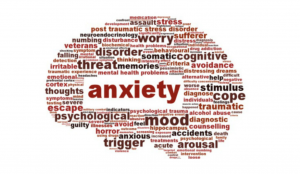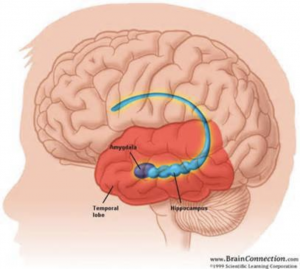
Anxiety is a common feeling that is a part of every person’s life and can arise due to various situations. However, anxiety disorders include long-term fear and worry with symptoms that can affect every day life. There are many types of anxiety disorders that involve many different symptoms, all of which include persisting worries. The most common anxiety disorders are generalized anxiety disorder, panic disorder, and other phobia-related disorders.
There are many risk factors of an anxiety disorder, including genetic and environmental aspects. Some common risk factors are temperamental traits of shyness in childhood, exposure to stressful and negative life events in early childhood/adulthood, history of anxiety or other mental illnesses, and some physical health conditions.
There are many, varying symptoms of anxiety disorders, but there are some general symptoms across most anxiety disorders. These include panic, fear, sleep problems, difficulty staying calm, sweaty or tingling hands or feet, shortness of breath, heart palpitations, dry mouth, nausea, tense muscles, and dizziness.
Common treatments for anxiety disorders are psychotherapy and medication. Psychotherapy involves talking and discussing a person’s specific anxieties to find the best treatment for what they need. This includes cognitive behavioral therapy, which helps to teach people ways of thinking, behaving, and reacting to stressful situations and objects. Cognitive therapy, which focuses on identifying, challenging, then neutralizing negative thoughts related to anxieties and exposure therapy, which focuses on confronting fears and worries are both examples of cognitive behavioral therapies. Medication does not cure anxiety disorders, but it does help to relieve symptoms of anxiety, panic attacks, fear, worry, and changing moods. Some other therapies for individuals struggling with anxiety disorders may benefit from support groups or stress management techniques.

When a traumatic event occurs, there is a long-lasting impact on behavior and changes in the brain occur, specifically in the hippocampus and amygdala. The hippocampus regulates emotions and is important in long-term memory. The amygdala is responsible for emotional responses and memory. Both of these brain structures play a role in the response to a stressful situation and the retainment of memories from that experience. The anxiety felt from a stressful situation can inhibit and impair the memories of that experience, causing the formation of strong memories, but negatively affecting the ability to adapt and cope with trauma and stress. There are many parts of the brain affected and conformational changes that are caused by stressors.
The dentate gyrus helps to form new memories and is located in the hippocampus. The main parts of the brain involved in working memory, which is memory that holds 7 items or less at a time and is the ability to remember and process information at the same time, are the prefrontal cortex and the hippocampus. Another main aspect of memory are hormones called glucocorticoids, which includes the main hormone for the stress response and play a role in restoring homeostasis after a stressful situation. Glucocorticoids bind to glucocorticoid receptors (GRs), which are crucial in encoding, processing, and retaining the information of emotional events. The activation of GRs cause a response to stress and long-term changes in the brain leading to the formation of long-term memories of the stressful experience. Moderate stress levels can have a positive effect on memory and brain function, but too much trauma or stress can cause memory loss, cognitive impairments, or increase risk of developing an anxiety disorder.

Overall, stress and anxiety disorders are greatly impacted by areas of the brain can inhibit or stimulate memory when presented with different situations. The difficulty with mental illnesses such as anxiety disorders is all of the possible factors that can be involved and how specific situations can cause changes in the brain that affect the individual for a lifetime. There are still so many unknowns and underlying factors with anxiety disorders, making treatment and future research difficult. Individuals dealing with anxiety disorders all experience them in different ways, which leads to many therapies being geared specifically toward that individual. This can cause deficits to a person’s treatment at first, as finding the right treatment plan for each individual looks different and takes time to discover.
https://www.nimh.nih.gov/health/topics/anxiety-disorders/index.shtml